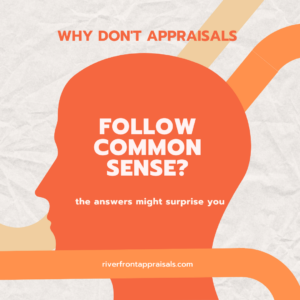
Property Taxes Just Went Up? We’ve Got You Covered!
It’s reassessment season for most folks in our area. Homeowners

We recently did an appraisal on a home that was under contract. During the inspection portion of the appraisal, we were discussing with the homeowner the next steps of the appraisal process. We’ll send in the report, and you should hear from your lender soon after. If you have any questions, contact your lender. And so on. They appreciated the head’s up, but then asked the question, “what happens if my home doesn’t appraise for the contract price?” This blog post will briefly answer that question and will give you the tools you need to understand this part of the appraisal process.
[bctt tweet=”“what happens if my appraisal comes back under contract price?” This blog post will briefly answer that question and will give you the tools you need to understand this part of the appraisal process.” username=”RiverfrontApp1″]
If a home appraises for less than contract price, most parties have three options:
Option 1: Lower the sale price to the appraised value.
Every once in a while, the parties to a transaction will agree on a sale price of a home, and the appraisal comes back lower than that price. You’ve contacted the appraiser (see the end of this post), but the data and/or sales information you had didn’t help your cause. As a purchaser, you might think, “I’m not gonna spend one dollar more than what the appraiser says it’s worth!” Ok. That’s fine. You’ll have to get the seller to agree to that, though. Sometimes, if the difference is minimal, a seller will simply lower the sale price to reflect the appraised value. They take less than they thought they were going to get, and you get the home for a price you’re comfortable with. The home is sold. Everyone moves on. And everyone is (mostly) happy.
According to Ryan Rutman, a Realtor with Re/Max Professional Realty Group, after sellers take “a couple nights to sleep on it…[they usually] sell the house for what the appraised value is.”
But the seller is not always so willing…
Option 2. The buyer comes out of pocket for the difference.
Sometimes a seller won’t budge off the contract price, even after an appraisal comes in below contract.
Now, if you’re obtaining financing for your dream home, you’ll likely be getting an appraisal. And although there are some 100% financing options out there today, the financial institution will likely only lend you a percentage of the appraised value (usually somewhere between 80%-95%). That means if you are under contract to purchase a $100,000 home, and the lender will loan up to 80% of the appraised value, you’ll have to come up with $20,000 as a down payment. With me? Good.
Now here’s where it gets difficult. Suppose the home only appraises for $90,000. Now, the lender will only loan you $72,000 ($90,000 x 80%). That means if the seller isn’t willing to lower the price, you have to pony up an additional $8,000 on top of the 20 grand you were already expecting to pay. That could be a deal breaker for some. But it is an option. However, as Rutman states, “most of the time… the buyers typically aren’t comfortable putting more cash into it.”
Option 3. The sale is canceled.
This is the worst-case scenario. The seller won’t budge, and you don’t have any extra cash lying around. So what do you do? If a meeting of the minds can’t be reached, you simply void the contract, go look for another home, and the seller can sell their home to someone else.
Make sure you speak with your Realtor and that you have in your purchase agreement an appraisal clause. Most purchase agreements we see today have a clause that will allow you to void the contract if the home doesn’t appraise for at least the contract price.
I hope this option doesn’t happen to you, but if it does – remember that there’s another home out there just for you!
I asked Ryan what tips he would give a buyer or seller facing an appraisal that comes in under contract price. He suggests trying to remove the emotion (although admittedly very hard). “Be sure to revisit your goals, plans and objectives” he says, “and remember why you chose to sell to begin with.” He also suggests evaluating the difference in sale price vs appraised value from a time vs. money perspective. “Ask yourself, is it worth giving up the $5,000 [for example] now, to know that the house is sold and we’re able to move on with our future plans, or whatever the goals are?” “The amount of time your house has been for sale is a key factor, too” Rutman says. “If it’s been on the market for a long time, and you had very little interest, then it probably makes the most sense to move forward with the deal.”
Now, if you’ve read this far (first of all, thank you!), you might be asking yourself, “why can’t I just contact the appraiser?” And the answer is…you can! So in essence, the buyer has four options, and not three. We’ve chosen to address these three options first, because not every financial institution has in place a procedure for challenging appraisals. And, it can be a lengthy process some buyers or sellers might not have the time for. So that’s another post for another day. We’ll explore the proper way to challenge an appraisal – what to do, what not to do, when to do it, and how to be proactive – all in next week’s blog. Stay tuned!
Helping homeowners navigate the appraisal process,
Ryan Bays, SRA, AI-RRS

It’s reassessment season for most folks in our area. Homeowners

I feel like we all need a laugh. How about

So this may be a slight break from the norm,
Riverfront Appraisals has been providing comprehensive valuations of residential properties to Western Kentucky and Southwestern Indiana since 2008.